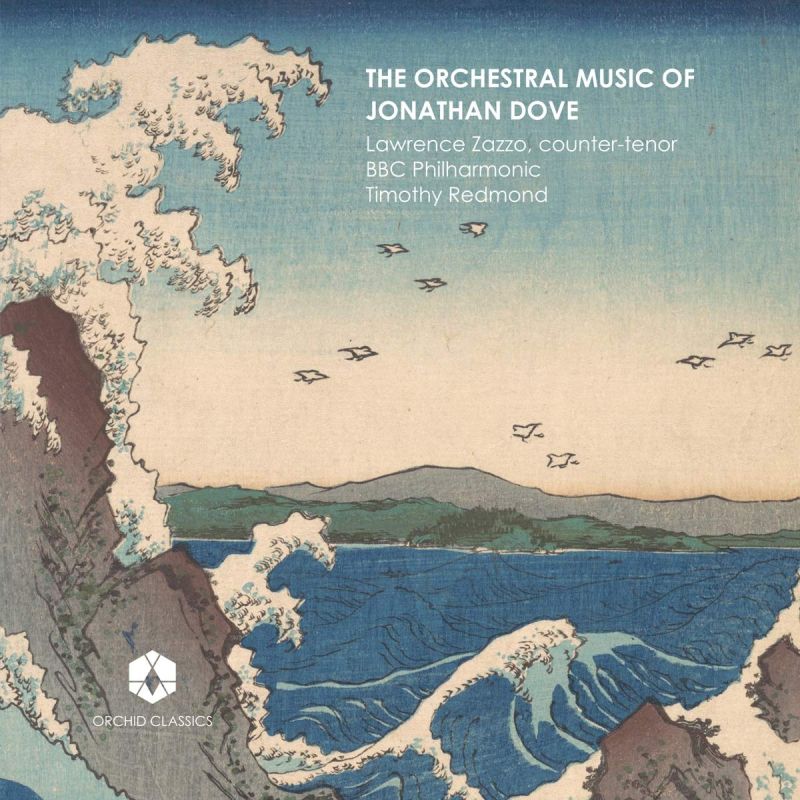The Orchestral Music of Jonathan Dove
View record and artist detailsRecord and Artist Details
Composer or Director: Jonathan Dove
Genre:
Orchestral
Label: Orchid Classics
Magazine Review Date: 08/2019
Media Format: CD or Download
Media Runtime: 79
Mastering:
DDD
Catalogue Number: ORC100097

Tracks:
| Composition | Artist Credit |
|---|---|
| Run to the Edge |
Jonathan Dove, Composer
BBC Philharmonic Orchestra Jonathan Dove, Composer Timothy Redmond, Conductor |
| The Ringing Isle |
Jonathan Dove, Composer
BBC Philharmonic Orchestra Jonathan Dove, Composer Timothy Redmond, Conductor |
| Hojoki (An Account of my Hut) |
Jonathan Dove, Composer
BBC Philharmonic Orchestra Jonathan Dove, Composer Lawrence Zazzo, Countertenor Timothy Redmond, Conductor |
| Flight, Movement: Airport Scenes - Suite |
Jonathan Dove, Composer
BBC Philharmonic Orchestra Jonathan Dove, Composer Timothy Redmond, Conductor |
| Gaia Theory |
Jonathan Dove, Composer
BBC Philharmonic Orchestra Jonathan Dove, Composer Timothy Redmond, Conductor |
Author: Andrew Mellor
The heart and soul of Dove’s magical opera Flight is lost in the four-movement suite derived from it, which is partly to do with a lack of theatrical context and human presence but is also connected to the fact that, in an orchestral sense, the harbouring of flight – taking off, landing – doesn’t have the monumentality it does in Adam’s Nixon in China (an obvious model).
Adams looms large here – over the last movement of Gaia Theory (2014) and in the glistening opener, Run to the Edge (2003), a tight and attractive piece which contains gestures, notably the bass drum thwacks at 2'20", that are uncannily close to moments in Adams (the plane landing in Nixon, funnily enough). There’s something more relevant when Dove speaks late 20th-century minimalism with a distinctly English accent, as in The Ringing Isle (1997); but despite the structural interest it can slip towards a tapestry that doesn’t evolve quite as engrossingly as some other works based on the change-ringing technique.
It’s Dove’s operas that have taken his music around the world, for the principal reason that he writes for the theatre in such a natural, human way. The cantata for countertenor Hojoko (no texts are included in the booklet) is more abstracted. It carries a sense of the asceticism of a Japanese garden but, at the same time, it’s a long slog and seems fixated on certain intervallic shapes in the solo part including minor thirds (Lawrence Zazzo has some voice but it can tighten up high and 29 minutes in its presence feels a while). The spacious central movement of Gaia is the highlight here, while the playing throughout is excellent and the sound first-rate. There’s no doubting Dove can be derivative and indistinct but somehow that’s of less import when encountering one of his works in the theatre or live in concert. Perhaps home listening just isn’t what it’s made for.
Discover the world's largest classical music catalogue with Presto Music.

Gramophone Digital Club
- Digital Edition
- Digital Archive
- Reviews Database
- Full website access
From £8.75 / month
Subscribe
Gramophone Full Club
- Print Edition
- Digital Edition
- Digital Archive
- Reviews Database
- Full website access
From £11.00 / month
Subscribe
If you are a library, university or other organisation that would be interested in an institutional subscription to Gramophone please click here for further information.




